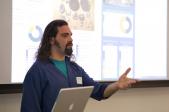
LEED AP Instructor, Stanford University
In my class ME221, Green Design Strategies & Metrics, we have mechanical engineers, product designers, business students, and other disciplines; all of these people have different skill sets and interests, but all need the same fundamental working knowledge of what sustainability means for products. I use Sustainable Minds to introduce them to the idea of life cycle assessment, because it has a simple, clear user interface that steps people through the process, and because its analysis results are simple enough for the students of all different disciplines to understand, while still having enough technical detail with which to make design decisions. I have tried over a dozen LCA tools from around the world, and SM is one of the best I have found for this purpose.
This is the exercise I give:
1.Students are divided into groups and each group receives an old dead product (toaster, clock, stapler, what have you).
2.They then do a retrospective LCA on the product, estimating its power use and other consumables use, tearing it apart and identifying the materials and masses of all components, and entering it into the software. They then identify the biggest priorities for improving the sustainability of that particular product.
3.Finally, they do three speculative redesigns of the product and perform LCA on those redesigns, comparing the results to see which strategies were most effective.
Students always find it highly instructive, as the biggest ecological impacts of their products are rarely what they would have expected, and the most effective strategies are often surprising as well.









